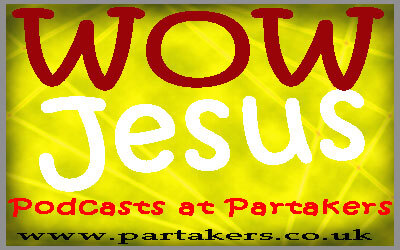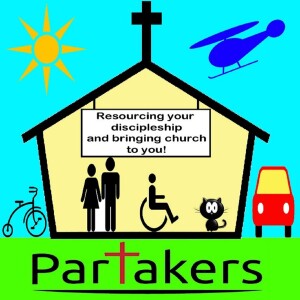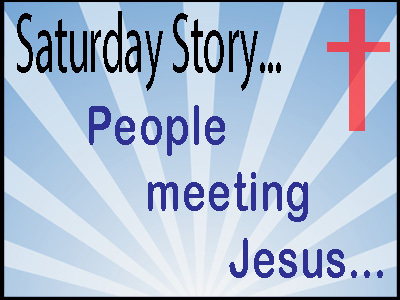
G’day and welcome to Partakers Christian Podcasts! Join us for uplifting Bible teaching, inspiring readings, heartfelt worship, powerful prayers, and fascinating church history. Whether you’re new to faith or growing deeper in your journey, we’re here to encourage and equip you. 🎧 Tune in, interact, and be inspired—wherever you are in the world.
Episodes

Sunday Jun 08, 2025
Bible Thought - Pentecost Sunday
Sunday Jun 08, 2025
Sunday Jun 08, 2025
The Holy Spirit Comes
G'day! Today is Pentecost Sunday where Christians around the world remember and celebrate the coming of the promised Holy Spirit! Happy Pentecost!
Jesus has now ascended back to the right hand of the Father. The 12 apostles are now back in Jerusalem and waiting. Waiting for the Holy Spirit to come. The coming of God the Holy Spirit is in fulfilment of the promise that Almighty and All-powerful God would indwell all those people who chose to follow Him. This event was prophesied many years before. An example is from the prophet Ezekiel:
“And I will put my Spirit in you and move you to follow my decrees and be careful to keep my laws.” (Ezekiel 36:27)
Throughout His earthly ministry Jesus had talked about how after He departed that God the Holy Spirit would come (John 15:26). Starting today and over the coming few days we will look at the Holy Spirit and into the book of Acts seeing how the Holy Spirit worked within and through the early Church. Let's look together!

Saturday Jun 07, 2025
Saturday Testimony - Salvation and Healing
Saturday Jun 07, 2025
Saturday Jun 07, 2025
Saturday Story
People meeting Jesus
A story of salvation and healing
Today on Partakers, we hear the story of salvation and healing coming to a house! Come on in, and listen to this amazing story about the relevancy of Jesus Christ to this woman's life.

Thursday Jun 05, 2025
Thursday Testimony Story - God Said No
Thursday Jun 05, 2025
Thursday Jun 05, 2025
G'day and welcome to Partakers! Today we hear a testimony of how Partakers began! May 2007, in the final week before final dissertation submission at Moorlands College, I collapsed while at the GP. While unconscious I said "Dad, can I come home now?"
To which I was told by God, "No. Get up. We have a job for you to do." So I sat up, and the emergency paramedics came in, almost fainted and said: "You aren't supposed to be sitting up..." Collapse caused by sepsis due to ingrown hairs on my leg... Because of these events, we now do what we are doing, thanks be to God, reaching over 120 countries a year via social networks, paperbacks, ebooks, Podcasts and YouTube... Thanks for being part of our life, and I hope that I have shown in some way, that God loves you...
Come on in, listen to what happened next, how we began. By listening, you are sharing in the work that God has been doing through us!
Click or Tap here to listen to or save this as an audio mp3 file
~
You can now purchase our Partakers books! Please do click or tap here to visit our Amazon site!

Saturday May 31, 2025
Sharon’s Story from China - Partakers Bible Thought
Saturday May 31, 2025
Saturday May 31, 2025
The story of Sharon
The story of Sharon, from China, who converted to Christianity from Daoism/Buddhism.
Click or Tap here to listen to or save this as an audio mp3 file

Friday May 30, 2025
Bible Reading - Psalms 101 to 105
Friday May 30, 2025
Friday May 30, 2025
Psalm 96 to Psalm 100
Often we hear the Psalms one by one, but today we offer you the chance to hear a group of Psalms read as a collection!
Right mouse click or tap here to save/download these Psalms as a MP3 file
Psalm 101
1 I will sing of your love and justice;
to you, Lord, I will sing praise.
2 I will be careful to lead a blameless life –
when will you come to me?
I will conduct the affairs of my house
with a blameless heart.
3 I will not look with approval
on anything that is vile.
I hate what faithless people do;
I will have no part in it.
4 The perverse of heart shall be far from me;
I will have nothing to do with what is evil.
Right mouse click or tap here to save/download these Psalms as a MP3 file
Psalm 102
1 Hear my prayer, Lord;
let my cry for help come to you.
2 Do not hide your face from me
when I am in distress.
Turn your ear to me;
when I call, answer me quickly.
3 For my days vanish like smoke;
my bones burn like glowing embers.
4 My heart is blighted and withered like grass;
I forget to eat my food.
Right mouse click or tap here to save/download these Psalms as a MP3 file
Psalm 103
1 Praise the Lord, my soul;
all my inmost being, praise his holy name.
2 Praise the Lord, my soul,
and forget not all his benefits –
3 who forgives all your sins
and heals all your diseases,
4 who redeems your life from the pit
and crowns you with love and compassion,
5 who satisfies your desires with good things
so that your youth is renewed like the eagle’s.
Right mouse click or tap here to save/download these Psalms as a MP3 file
Psalm 104
1 Praise the Lord, my soul.
Lord my God, you are very great;
you are clothed with splendour and majesty.
2 The Lord wraps himself in light as with a garment;
he stretches out the heavens like a tent
3 and lays the beams of his upper chambers on their waters.
He makes the clouds his chariot
and rides on the wings of the wind.
4 He makes winds his messengers,
flames of fire his servants.
Right mouse click or tap here to save/download these Psalms as a MP3 file
Psalm 105
1 Give praise to the Lord, proclaim his name;
make known among the nations what he has done.
2 Sing to him, sing praise to him;
tell of all his wonderful acts.
3 Glory in his holy name;
let the hearts of those who seek the Lord rejoice.
4 Look to the Lord and his strength;
seek his face always.
Right mouse click or tap here to save/download these Psalms as a MP3 file

Thursday May 29, 2025
Bible Thought - WOW Factor of Jesus Christ - Part 18 - Ascension of Jesus
Thursday May 29, 2025
Thursday May 29, 2025

18. Jesus The Ascended King
Right mouse click or tap here to save this podcast episode as a mp3
Then the eleven disciples went to Galilee, to the mountain where Jesus had told them to go. When they saw him, they worshiped him; but some doubted. Then Jesus came to them and said, "All authority in heaven and on earth has been given to me. Therefore go and make disciples of all nations, baptizing them in the name of the Father and of the Son and of the Holy Spirit, and teaching them to obey everything I have commanded you. And surely I am with you always, to the very end of the age." Matthew 28:16-20
Jesus’ resurrection is the catalyst for the mission of the church, beginning with the disciples and throughout history. Jesus’ mission to earth is coming to an end and shortly He will be returning to the right hand of the Father. Before He does so though, He has some more words to say to His disciples.
Jesus’ Authority
Throughout the Gospel of Matthew, Jesus’ authority is a major theme. Where Matthew records Jesus doing miracles, this is to highlight Jesus authority in action and not just merely in words. Matthew records Jesus’ authority to forgive sins (Matthew 9:6) and he imparted authority to his disciples for a short time when they went on a mission in Matthew 10. Jesus has authority (Matthew 28:18) over all things, all people, all circumstances and happenings. Jesus has authority over all spiritual beings, whether angels or demons. Jesus has authority over all nations, governments and rulers. Jesus has authority over all earthly and spiritual authorities. Jesus has the authority. This means regardless of what ever the Christian Disciple faces, Jesus is in control. Therefore, as Christian Disciples, we can obey him without fear of retribution from those who would seek to harm us. We can obey him regardless of the circumstances we find ourselves in. It is a great comfort to know, that he is in control of everything!! Through his death on the cross and his rising from the dead, Jesus has conquered all enemies.
Now people sometimes confuse authority with authoritarian. Authoritarian means severe, rigidity and a dictator. None of these applies to Jesus. We have been given a free will, but as his Disciples, we should choose to exercise our free will to obey him and live a life worthy of him. As the Christian depends on Jesus’ authority, the Christian Disciple gains wisdom, guidance, and power.
You Go
If Jesus had not risen from the dead, then the Disciples would not have had a story to tell. But Jesus had indeed risen from the dead, and the early church exploded numerically as the twelve Disciples exercised Jesus’ authority and His power. We read about the growth of the early church in the Book of Acts.
Christianity is a faith whereby all Christian Disciples are to tell others of the goodness of God. Indeed God Himself is a missionary God. Ever since Genesis 3 and the fall of man, God has been on a mission to bring and call people back to himself. That was the purpose of the nation of Israel, to be a light to all nations of the goodness and glory of God! That was purpose when God, who is outside of time and space, entered human history taking on human flesh and restricted himself in a human body as the man we know as Jesus Christ. Jesus’ whole mission was one of calling people back to life in God. As followers of Jesus Christ, all Christian Disciples are to evangelize. Evangelism is showing and telling others of God’s message of reconciliation to all people of all time. It is not forcing people to adopt Church standards (1 Corinthians 5:12) and nor is it simply a message of join the church as a symbol of good works (Ephesians 2:v8-10).
Why evangelize? The prime motivation for evangelism is out of gratitude for what God has done, in that we love because he loved us first. Paul writes in 2 Corinthians 5:14, “For Christ's love compels us, because we are convinced that one died for all, and therefore all died.” As his servants we are to tell and live out God’s reconciling message
As I said before, we are all to do the work of an evangelist (2 Timothy 4:5). In these last words of Matthew’s Gospel, all Christian Disciples are to make disciples throughout the whole earth! Making disciples is not just evangelism but ensuring that guidance and care is given to new Christian disciples. How is this achieved? How can the Christian Disciple exhibit Jesus’ authority and power in evangelism? Who gives the impetus for Christian Disciples? That is part of the role of the Holy Spirit, whom Jesus said would come once He had ascended back to the right hand of God the Father.
The Holy Spirit is coming
This is in fulfilment of Ezekiel 36:27 “And I will put my Spirit in you and move you to follow my decrees and be careful to keep my laws”, where the Almighty and All-powerful God will indwell those who follow him. Throughout his ministry Jesus had talked about how after he was to depart, and that the Holy Spirit would come (John 15:26).
We know from the other writings in the New Testament who the Holy Spirit is and what his ministry is.
The Holy Spirit is spoken of as God (1 Corinthians 3:16). The attributes of God are ascribed to the Holy Spirit - life (Romans 8:2), truth (John 16:13) and love (Romans 15:30).
The Holy Spirit is also a Person and is always referred to as ‘he’ in the New Testament (John 16:14). He relates to us as a person for he is comforter, guide and teacher (John 14). He can be blasphemed against and be grieved (Ephesians 4:30), and wherever the Holy Spirit is, the Father and Son are also present because they are one. (John 14:18-23).
The Ministry of the Holy Spirit
What is the ministry of the Holy Spirit and what does e have to do with Christian Disciples?
1. Glorify Christ: This is the Spirit’s prime role, that he will glorify Jesus Christ the Son of God, who is to be praised and glorified (John 16:13-14). He will testify for Jesus Christ (John 15:26). He will witness for Jesus Christ (Acts 1:8).
2. The Paraclete – Comforter: He is one called to stand alongside (John 14:16). Jesus said it would be better for him to go away and send the Holy Spirit to live in us (John 16:7). The Holy Spirit ministers to us all that Jesus would be to us if he were here in person.
3. Declares God’s Word: The Holy Spirit has a prime role in revelation. It was he that spoke through the prophets (Ezekiel 2:2) and it was he who inspired the Bible, God’s Word (2 Peter 1:21). Further to this, the Holy Spirit interprets and illuminates God’s Word (John 16:12-15; 1 Corinthians 2:10-16) to people!
4. Conviction: The Holy Spirit is sent to convict the world of sin, righteousness and judgment (John 16:8)
5. Salvation: Christian Disciples are born of the Holy Spirit and are known as regenerated (John 3:3-8)
6. Indwelling: God lives inside each Christian Disciple through the Holy Spirit. Without the Holy Spirit, a person cannot be a Christian Disciple (Romans 8:9; Gal 2:20; Colossians 1:25-27)
7. Sealing / Ownership: The Holy Spirit indwelling the Christian Disciple is assured proof of being God’s possession (2 Corinthians 1:22; Ephesians 1:3)
8. Security: The Holy Spirit is a deposit, guaranteeing our future redemption, salvation and inheritance (Ephesians 1:13; 2 Corinthians 1:22).
9. Filling: This speaks of the Holy Spirit’s control or domination of our lives. The imperative here is that we are to be filled (Ephesians 5:18), and go on being filled. He gives power to enable Christian Disciples to evangelise (Acts 1:8; 4:8, 31).
10. Sanctification: The Holy Spirit transforms us into the likeness of Christ (2 Corinthians 7-18), as we walk, live in, and are led by the Spirit (Galatians. 5:16; Romans 8:13).
11. Baptism: This expression occurs 7 times in the New Testament. It occurs 4 times in the gospels, referring to Jesus baptizing with the Holy Spirit and with fire. 1 Corinthians 12:13 states that we are all baptized with the Holy Spirit into one body.
12. Service: The Holy Spirit equips us for service. God is working in you to will and to act accordingly to his purpose (Phil. 2:13), to be my witnesses (Acts 1:8).
How is the Spirit seen? The Spirit’s work is in evidence where people’s lives become more holy and more like Jesus Christ (1 Corinthians 12:3; 2 Corinthians 13:7).
The Holy Spirit equips Christian Disciples for service through the giving of spiritual gifts. Elsewhere on this website that has been discussed.
Ask yourself the following questions and see how you respond or react to them. Then why not share your answers with your spouse or a close friend, so that you can pray over any issues together.
Q1. Read Matthew 28:16-20. How does the authority of Jesus aid me in evangelism?
Q2. Read John 21. How am I carrying my cross for the sake of Jesus Christ?
Q3. How is the presence of the Holy Spirit transforming me into the image of Jesus Christ?

Wednesday May 28, 2025
Bible Reading - Psalms 91 to 95
Wednesday May 28, 2025
Wednesday May 28, 2025
Psalm 91 to Psalm 95
Often we hear the Psalms one by one, but today we offer you the chance to hear a group of Psalms read as a collection!
Right mouse click or tap here to save/download these Psalms as a MP3 file
Psalm 91
1 Whoever dwells in the shelter of the Most High
will rest in the shadow of the Almighty.
2 I will say of the LORD, ‘He is my refuge and my fortress,
my God, in whom I trust.’
3 Surely he will save you from the fowler’s snare
and from the deadly pestilence.
4 He will cover you with his feathers,
and under his wings you will find refuge;
his faithfulness will be your shield and rampart.
Right mouse click or tap here to save/download these Psalms as a MP3 file
Psalm 92
1 It is good to praise the LORD
and make music to your name, O Most High,
2 proclaiming your love in the morning
and your faithfulness at night,
3 to the music of the ten-stringed lyre
and the melody of the harp.
4 For you make me glad by your deeds, LORD;
I sing for joy at what your hands have done.
5 How great are your works, LORD,
how profound your thoughts!
6 Senseless people do not know, fools do not understand,
7 that though the wicked spring up like grass
and all evildoers flourish, they will be destroyed for ever.
8 But you, LORD, are for ever exalted.
Right mouse click or tap here to save/download these Psalms as a MP3 file
Psalm 93
1 The LORD reigns, he is robed in majesty;
the LORD is robed in majesty and armed with strength;
indeed, the world is established, firm and secure.
2 Your throne was established long ago;
you are from all eternity.
3 The seas have lifted up, LORD,
the seas have lifted up their voice;
the seas have lifted up their pounding waves.
4 Mightier than the thunder of the great waters,
mightier than the breakers of the sea –
the LORD on high is mighty.
5 Your statutes, LORD, stand firm;
holiness adorns your house
for endless days.
Right mouse click or tap here to save/download these Psalms as a MP3 file
Psalm 94
1 The LORD is a God who avenges.
O God who avenges, shine forth.
2 Rise up, Judge of the earth;
pay back to the proud what they deserve.
3 How long, LORD, will the wicked,
how long will the wicked be jubilant?
4 They pour out arrogant words;
all the evildoers are full of boasting.
5 They crush your people, LORD;
they oppress your inheritance.
6 They slay the widow and the foreigner;
they murder the fatherless.
7 They say, ‘The LORD does not see;
the God of Jacob takes no notice.’
Right mouse click or tap here to save/download these Psalms as a MP3 file
Psalm 95
1 Come, let us sing for joy to the LORD;
let us shout aloud to the Rock of our salvation.
2 Let us come before him with thanksgiving
and extol him with music and song.
3 For the LORD is the great God,
the great King above all gods.
4 In his hand are the depths of the earth,
and the mountain peaks belong to him.
5 The sea is his, for he made it,
and his hands formed the dry land.
Right mouse click or tap here to save/download these Psalms as a MP3 file

Tuesday May 27, 2025
Bible Reading - Psalms 86 to 90
Tuesday May 27, 2025
Tuesday May 27, 2025
Psalm 86 to Psalm 90
Often we hear the Psalms one by one, but today we offer you the chance to hear a group of Psalms read as a collection!
Right mouse click or tap here to save/download these Psalms as a MP3 file
Psalm 86
A prayer of David.
1 Hear me, Lord, and answer me, for I am poor and needy.
2 Guard my life, for I am faithful to you;
save your servant who trusts in you.
You are my God;
3 have mercy on me, Lord, for I call to you all day long.
4 Bring joy to your servant, Lord, for I put my trust in you.
Right mouse click or tap here to save/download these Psalms as a MP3 file
Psalm 87
Of the Sons of Korah. A psalm. A song.
1 He has founded his city on the holy mountain.
2 The Lord loves the gates of Zion more than all the other dwellings of Jacob.
3 Glorious things are said of you, city of God:
4 ‘I will record Rahab and Babylon among those who acknowledge me –
Philistia too, and Tyre, along with Cush – and will say, “This one was born in Zion.”’
5 Indeed, of Zion it will be said,
‘This one and that one were born in her,
and the Most High himself will establish her.’
6 The Lord will write in the register of the peoples:
‘This one was born in Zion.’
7 As they make music they will sing, ‘All my fountains are in you.’
Right mouse click or tap here to save/download these Psalms as a MP3 file
Psalm 88
A song. A psalm of the Sons of Korah. For the director of music. According to mahalath leannoth. A maskil of Heman the Ezrahite.
1 Lord, you are the God who saves me;
day and night I cry out to you.
2 May my prayer come before you;
turn your ear to my cry.
3 I am overwhelmed with troubles and my life draws near to death.
4 I am counted among those who go down to the pit;
I am like one without strength.
5 I am set apart with the dead, like the slain who lie in the grave,
whom you remember no more, who are cut off from your care.
Right mouse click or tap here to save/download these Psalms as a MP3 file
Psalm 89
A maskil of Ethan the Ezrahite.
1 I will sing of the Lord’s great love for ever;
with my mouth I will make your faithfulness known
through all generations.
2 I will declare that your love stands firm for ever,
that you have established your faithfulness in heaven itself.
3 You said, ‘I have made a covenant with my chosen one,
I have sworn to David my servant,
4 “I will establish your line for ever and make your throne firm through all generations.”’
Right mouse click or tap here to save/download these Psalms as a MP3 file
Psalm 90
A prayer of Moses the man of God.
1 Lord, you have been our dwelling-place throughout all generations.
2 Before the mountains were born or you brought forth the whole world,
from everlasting to everlasting you are God.
3 You turn people back to dust, saying, ‘Return to dust, you mortals.’
4 A thousand years in your sight are like a day that has just gone by,
or like a watch in the night.
5 Yet you sweep people away in the sleep of death –
they are like the new grass of the morning:
6 In the morning it springs up new, but by evening it is dry and withered.
Right mouse click or tap here to save/download these Psalms as a MP3 file

Monday May 26, 2025
Testimony - From Skeptic to Salvation
Monday May 26, 2025
Monday May 26, 2025
From Skeptic to Salvation
I am Richard. I am 62 years of age. For 59 years of my life, I lived with faith " only in myself ".I was at best a Skeptic, at worst an Atheist. I would go right out of my way to test and very strongly argue against anyone I met, who professed to have a faith, in any sort of God. I needed nothing, but my own free will. All my faith was "only" in myself.
In 2002 / 2003 my world fell apart. I was left alone to myself. All my lifelong responsibilities disappeared. I became for 2 years a solitary hermit, living in my house, completely alone. It was during this time, alone, that I started to question, :- What my life was about. What was I here for. What was the reason for my being, if there even was one. I wanted, and so needed contact with other people. I needed to talk, to be listened to, and to listen to others. We are not meant to be solitary beings we are social creatures. We so need fellowship with others, like we need food.
After over 2 years of self imposed solitary confinement, I was becoming worried about losing my ability to communicate with others. It was back just before Christmas 2005, I received through my door the usual annual programme of all the Churches in my area, listing all their events, over the Christmas period. I decided to systematically visit all of them. Not to seek faith, Oh No', I'm a Skeptic, an Atheist. I just want to have communication with others. I visited most of the local Churches over the coming months, and always found people to speak and listen to, but none of the Churches somehow felt right for me, until I visited " Verwood Road Evangelical Chapel", just up the road from where I live, in Three Legged Cross. Here I felt good, " well better ". I liked the way they did things. It was not a liberal church. It was more leaning towards, a Brethren sort of fellowship, but not too hard line. There was no pomp or high ceremony, no fancy clothes or precious things to see or worship. These were ordinary people, just like me.
Over the next 10 months I visited V.R.C. " on and off " at first, maybe once or twice a month and found that I liked it more and more, so I went more and more. By October 2006, I found that I was wanting to go not only every Sunday but twice on Sundays. It was at this time that I seriously decided to the best of my ability, to very fully investigate just what this Christianity was really all about. How could so many intelligent, thinking people, believe in it?
For the next 6 months, I lived in the single minded state of total study of the Christian faith. I devoted all of my time to the study of the Bible and many, many books, both for and against the Christian faith. I prayed and prayed so very hard to God to give me a definite sign - a proof that God was out there and not something made-up in my own mind. I was in heartfelt tears, many, many times, asking for some proof, a miracle even, a certain sign, anything, but no sign or proof came. I was God's for the taking, but both He, and my heart, wasn't ready.
In late March 2007, something happened to turn me completely off Christianity. I went from very serious " single minded seeking " with all my heart and soul, TO - " This Christianity is certainly not for me ". It is not " at all " important what " event " occurred to cause this absolute turn around. It is only important to understand that it was very strongly driven by " My Own Self Pride ". God knew that it had to be, for Him to use it, to turn this 60 year old Atheist into a Christian. It was during my very powerful, and emotional efforts, to try and take a wrong, and turn it into a right, No matter what the cost, that my eyes were turned back into myself. To see, or to start to see, that all I hated and despised in others, was also, very present in myself. I was no better, than all those that I felt the very strong need to " bring to rights " in my life. It was at this moment in time, of now seeing, just what " I Am ", that my life changed forever. I was born on Easter Friday, Good Friday, the 4th. April.
In 2007, Three days after my 60th. Birthday, at exactly 12:32 p.m. lunch-time on Easter Saturday, the 7th. April, I at last discovered, that I was nothing, undeserving of my life, A Sinner that so needed the forgiveness of God. This opened my heart to God, and at that very moment, He Came In. It was at this time, that I understood, for the very first time, the Amazing events of Easter, and that Jesus died for me, that I may have life, and live life, to the full.
The next day, Easter Sunday, 2007, I took my first communion with my God. I would now like to say, that I am not a writer, I agree with " Winnie The Pooh Bear ", when he said.:- "Yes' I know all my letters, but my spelling is wobbly. It's good spelling, but it wobbles, and my letters get into the wrong places!" I'm not a poet either. I'm a practical man, an engineer. In the early hours of Easter Monday morning, 2007, at 1:30 a.m. whilst I was sat in my back porch thinking " in a daze " about what had happened to me on Easter Saturday, I picked up a pen and without thinking, wrote out the following poem. It is un-referenced, original and un-edited. It is just as it came down to me, 37 hours after finding my faith.
This poem is called :- The Fellowship - ( Revealed )
I don't know where I'm going,
I don't know where I've been,
I don't know what's in store for me,
But God has hold, to let me see.
For he will surely show my way,
My guide,
to lead,
to change each day.
To give me life, I've never seen,
To serve, to try, to make life clean,
To hold me close, to let me go,
To understand, To love me so.
My God is One, with saviour Christ,
He gave for me, The Total Price.
My heart is found, the Ghost within,
Salvation sealed, Forgiven Sin.
My past remains, but all washed clean,
My future comes, like it's never been.
I cannot say the words I feel,
Of things that are, to me so real.
My sad, sad past, is gone, my futures clean,
For with my eyes, new life I've seen.
This gift of love, that has been given,
Shall remain with me, right through to Heaven.
I believe that this poem was written with God's help. There is nothing good that can come out of me, from my own self, Self. Any good that may come from me, comes through me, from God. So please just Praise the Lord. ( Thank you.)
Right mouse click or tap here to save this Podcast as a MP3

Saturday May 24, 2025
Bible Thought Sermon - God and His Church
Saturday May 24, 2025
Saturday May 24, 2025

God and His church!
As Christian Disciples, we declare that we believe in God! That's what we have been doing in our praises and testimonies! Somebody asked last week what I meant by a WOWFactor of God! Just that - testimonies of how great is our God. As Christian Disciples, we declare that we not only believe in the existence of God, but that we can know God personally! We declare that we can grow in our knowledge of this great and Almighty God who is infinite and beyond our limitations of space and time! This great and awe-inspiring God we trust, obey, follow and worship, amazing as it sounds, is personable and knowable. This God we worship is a personal God and not a remote being or an un-emotive statue to place on a shelf. More than that, this God wants to be known. So with that said, just who is God?
1. Who is God?
God's Natural Attributes
God's Moral Attributes
2. Our Relational Response
God desires to bring people back into relationship with Himself! To do so, God established a New Covenant! This Covenant has four main features:
- Justification - Sins will be forgiven and removed.
- Promised Holy Spirit - God will live inside people and they will be led by Him.
- Regeneration -God will renew & restore people.
- Restoration - God will be their God, and they will be His people.
The Church
Fellowship
Worship
Evangelism
Jesus' WOWFactor
As I close, here is my own WOWFactor about Jesus, the Son of God. My Jesus is unique, majestic, tender, wise, strong, and lovely. My Jesus, whom I seek to serve and obey in every facet of life. I often don't achieve it, but I know that when I fall and fail, I can ask for forgiveness and He will grant it from His wellsprings of grace and mercy. It is this Jesus whom I depend upon and personally know to be totally reliable in every way. When people let me down, turn away from me, discourage me, think wrongly off me, or incorrectly assume my motives.
This Jesus always picks me up. He never turns me away. He always encourages and embraces me. At the end of the day, I know that Jesus has been dependable, going ahead of me throughout the day! I give Him thanks. Amazing! This Jesus who died on a Roman cross two thousand years ago was the same Jesus who was raised from the dead, without decay, into newness of life and ascended to the right hand of the Father. What is more, this Jesus is coming back to gather His followers, to Himself. Jesus is coming back, but not as a baby this time. There will be no kitchy-kitchy koo factor this time. No! Jesus the Son of God, is coming back as the King of Kings and Lord of Lords. Are you ready?
Amazing! This God-man, Jesus, is coming back and He will do the most extraordinary thing. We read about it in Revelation 21:4 'He will wipe every tear from their eyes. Isn't that just the most amazing verse of Scripture? Picture the scene! Jesus Christ taking your face in His scarred hands and wiping away your tears - tears of suffering and tears of joy. You will say to yourself, it was all worth it - the trials, temptations, sufferings and experiences I have had for the sake of Jesus Christ my Master. Are you ready for Him?





